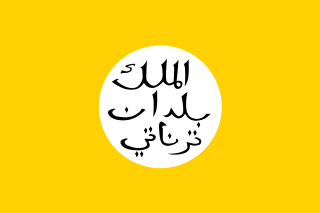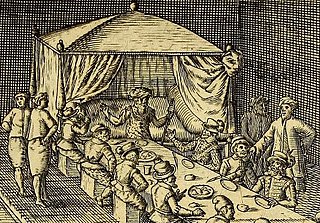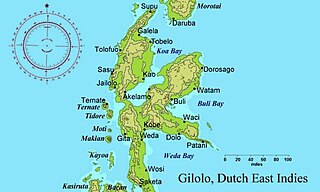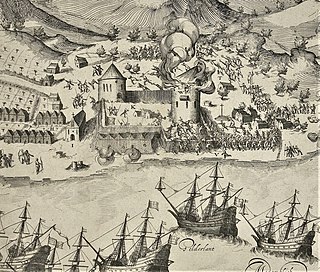
North Maluku is a province of Indonesia. It covers the northern part of the Maluku Islands, bordering the Pacific Ocean to the north, the Halmahera Sea to the east, the Molucca Sea to the west, and the Seram Sea to the south. The provincial capital is Sofifi on the largest island of Halmahera, while the largest city is the island city of Ternate. The population of North Maluku was 1,038,087 in the 2010 census, making it one of the least-populous provinces in Indonesia, but by the 2020 Census the population had risen to 1,282,937, and the official estimate as at mid 2022 was 1,319,338.

The Sultanate of Ternate, previously also known as the Kingdom of Gapi is one of the oldest Muslim kingdoms in Indonesia besides Tidore, Jailolo, and Bacan. The Ternate kingdom was established by Momole Cico, the first leader of Ternate, with the title Baab Mashur Malamo, traditionally in 1257. It reached its Golden Age during the reign of Sultan Baabullah (1570–1583) and encompassed most of the eastern part of Indonesia and a part of southern Philippines. Ternate was a major producer of cloves and a regional power from the 15th to 17th centuries.

The Sultanate of Tidore was a sultanate in Southeast Asia, centered on Tidore in the Maluku Islands. It was also known as Duko, its ruler carrying the title Kië ma-kolano. Tidore was a rival of the Sultanate of Ternate for control of the spice trade, and had an important historical role as binding the archipelagic civilizations of Indonesia to the Papuan world. According to extant historical records, in particular the genealogies of the kings of Ternate and Tidore, the inaugural Tidorese king was Sahjati or Muhammad Naqil whose enthronement is dated 1081 in local tradition. However, the accuracy of the tradition that Tidore emerged as a polity as early as the 11th century is considered debatable. Islam was only made the official state religion in the late 15th century through the ninth King of Tidore, Sultan Jamaluddin. He was influenced by the preachings of Syekh Mansur, originally from Arabia. In the 16th and 17th centuries, the sultans tended to ally with either Spain or Portugal in order to maintain their political role, but were finally drawn into the Dutch sphere of power in 1663. In spite of a period of anti-colonial rebellion in 1780-1810, the Dutch grip on the sultanate increased until decolonization in the 1940s. Meanwhile, Tidore's suzerainty over Raja Ampat and western Papua was acknowledged by the colonial state. In modern time, the sultanate has been revived as a cultural institution.

Sultan Babullah, also known as Sultan Baabullah was the 7th Sultan and 24th ruler of the Sultanate of Ternate in Maluku who ruled between 1570 and 1583. He is known as the greatest Sultan in Ternatan and Moluccan history, who defeated the Portuguese occupants in Ternate and led the Sultanate to a golden peak at the end of the 16th century. Sultan Babullah was commonly known as the Ruler of 72 (Inhabited) Islands in eastern Indonesia, including most of the Maluku Islands, Sangihe and parts of Sulawesi, with influences as far as Solor, East Sumbawa, Mindanao, and the Papuan Islands. His reign inaugurated a period of free trade in the spices and forest products that gave Maluku a significant role in Asian commerce.

Sultan Hairun Jamilu was the 6th Muslim ruler of Ternate in Maluku, reigning from 1535 to 1570. During his long reign, he had a shifting relation to the Portuguese who had a stronghold in Ternate and tried to dominate the spice trade in the region. This ended with his assassination at the hands of a Portuguese soldier in 1570.
Bayan Sirrullah was the second Sultan of Ternate in Maluku. He is also known as Abu Lais or Kaicili Leliatu. He ruled from perhaps 1500 to 1521, and is important as the first east Indonesian ruler who made contact with the encroaching Portuguese.
Dayal also known as Hidayatullah was the fourth Sultan of Ternate in Maluku. He had a short and largely nominal reign between 1529 and 1533 before fleeing Ternate due to Portuguese pressure. He later tried to create an anti-Portuguese alliance among the kings in North Maluku, but was mortally wounded in battle against the Europeans.

Sultan Saidi Berkat was the eighth Sultan of Ternate in the Maluku Islands. He succeeded to the extensive east Indonesian realm built up by his father Sultan Babullah, reigning from 1583 to 1606. The Spanish, who colonized the Philippines and had interests in Maluku, repeatedly tried to subdue Ternate, but were unsuccessful in their early attempts. Saidi's reign coincides with the arrival of the Dutch in Maluku, which indirectly caused his deposal and exile through a Spanish invasion.
Sultan Mudafar Syah I, also spelt Muzaffar Syah, was the ninth Sultan of Ternate who ruled from 1606 to 1627. He reigned during an important transitional phase, when the Dutch East India Company gained ascendency in the Maluku Islands and began to regulate the commerce in spices. This was the beginning of the colonial subordination of Maluku that would accelerate during his successors.
Sultan Hamza was the tenth Sultan of Ternate in the Maluku Islands. He ruled from 1627 to 1648, during a time when the Dutch East India Company (VOC) increasingly dominated this part of maritime Southeast Asia, and the increasing power of the Makassar kingdom threatened the Ternatan possessions.
Sultan Al-Mansur was the second Sultan of Tidore in Maluku islands, who reigned from at least 1512 until 1526. Certain legends associate him with the beginnings of Tidore's rule over the Papuan Islands and western New Guinea. During his reign the first visits by Portuguese and Spanish seafarers took place, which led to grave political and economic consequences for the societies of eastern Indonesia. Trying to preserve his realm in the face of Western encroachment, he finally fell victim to Portuguese enmity.
Sultan Mir, or Amiruddin Iskandar Dulkarna'in was the third Sultan of Tidore in Maluku Islands. He had a long and troubled reign from 1526 to the 1550s where he tried to counter the hegemonic ambitions of the Portuguese and their Ternate allies. The global rivalries between Spain and Portugal characterized the period, and the two Iberian powers indiscriminately involved the spice sultanates Tidore and Ternate in their power game.
Sultan Gapi Baguna, also known as Sirajul Arifin, was the sixth Sultan of Tidore in Maluku Islands. He reigned from 1560 to 1599, a time of major political realignments. Due to the great expansion of Tidore's rival Ternate, the previous Tidorese hostility towards the Portuguese was changed into a strategic policy of cooperation, while the Spanish establishment in the Philippines and the Iberian Union in 1581 brought him Spanish support.
Mole Majimun was the seventh Sultan of Tidore in Maluku Islands, who reigned from 1599 to 1627. He was also known as Sultan Jumaldin or Kaicili Mole. In his time the transition to the hegemony of the Dutch East India Company (VOC) began in eastern Indonesia, though Tidore held on to its traditional alliance with the Spanish Empire.
Sultan Saidi was the tenth Sultan of Tidore in Maluku islands. He was also known as Magiau and ruled from 1640 to 1657. His reign saw intermittent hostilities with Tidore's traditional rival, the Sultanate of Ternate, which included interference in an anti-Dutch rebellion in Ternate and Ambon and attempts to increase Tidorese territory in Maluku. By the time of Saidi's reign Tidore had gained a political position in parts of the Papuan territories.
Cico according to historical tradition, was the first king (Kolano) of Ternate in Maluku Islands, Indonesia. His regnal years are given as 1257-1277. Being originally chief of Sampalu village by the coast, he was acknowledged as ruler by the other village leaders in Ternate, starting a dynasty that is still in existence. There are however, several versions of the foundation story, some of which say that Mashur-ma-lamo, son of the Arab immigrant Jafar Sadik, was the first king.
The pre-Islamic rulers of Ternate lorded over the leading spice-producing kingdom in the Maluku Islands in present-day Indonesia. They are known from several partly different historical traditions. One version commences with Cico, a chief of the coastal village Sampalu who obtained a mystical golden mortar and pestle and was elected king (Kolano) by the chiefs of the islands. Other versions start with Mashur-ma-lamo, son of the Arab immigrant Jafar Sadik and a heavenly nymph. Ternate was part of a ritual quadripartition together with the kingdoms of Tidore, Jailolo and Bacan. After many generations, King Tidore Wonge converted to Islam and became Sultan under the name Zainal Abidin (1486?-1500?).

The Sultanate of Jailolo was a premodern state in Maluku, modern Indonesia that emerged with the increasing trade in cloves in the Middle Ages. Also spelt Gilolo, it was one of the four kingdoms of Maluku together with Ternate, Tidore, and Bacan, having its center at a bay on the west side of Halmahera. Jailolo existed as an independent kingdom until 1551 and had separate rulers for periods after that date. A revivalist Raja Jailolo movement made for much social and political unrest in Maluku in the 19th century. In modern times the sultanate has been revived as a symbolic entity.

The Ternatean–Portuguese conflicts were a series of conflicts in the Spice Islands in eastern Indonesia between the Portuguese and their allies on one hand, and the Sultanate of Ternate and its allies, on the other. Hostilities broke out from time to time after the establishment of Portugal in Moluccas in 1522. The strongly Catholic and Muslim identities of the combatants gave the struggle elements of a war of religion, although this aspect was frequently blurred by cross-faith alliances. It was also an economic war since the Portuguese aim was to control export of the profitable trade in cloves. Portuguese-Ternatan rivalry later merged with attempts of expansion by the Spanish in the Philippines. The Portuguese were eventually defeated in 1605 by an alliance between the Dutch East India Company (VOC) and Ternate, ending their active involvement in Moluccas affairs. However, they were soon replaced by the Spanish who maintained an Iberian presence in the region up to 1663.








